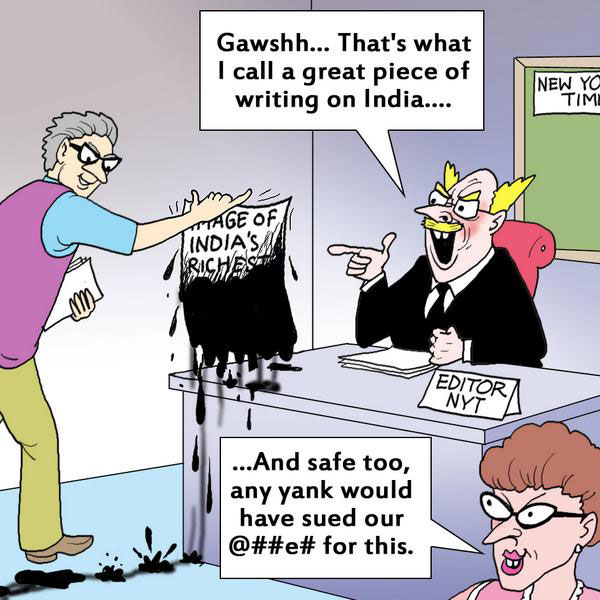On July 23, Manu Joseph, author and senior journalist, published a signed article on Mr Mukesh Ambani, chairman of Reliance Industries. He claimed that Mr Ambani’s “image has been diminished” and that Reliance Industries has run into trouble though it is “richer than ever”.
This is a critique of that article because Mr Joseph succumbs to the season’s favourite journalistic temptation of elevating any discussion around Reliance to hoary constitutional heights of freedom of expression followed, inevitably, by a pronouncement of guilt by extrapolation.
And, yes, I work for Reliance Industries as news and communications director. If you think my right to a personal position on the freedom of expression debate is co-terminus with my joining Reliance, you may want to disconnect here.
But if you are still with me, here’s how I’ve organized this piece: Since I cannot assume that all of you have read the NYT piece, I have reproduced it as it appeared on their website on July 23 and punched in my comments within the article. I have highlighted, in yellow, the specific phrases and sentences of Mr Joseph that do not pass the fair-journalism muster. The passages in red are my comments.
Mr Joseph’s article begins here:
LETTER FROM INDIA
The Image of India’s Richest Man Loses Luster.
Mukesh Ambani’s Reliance Industries Runs Into Trouble
By MANU JOSEPH
JULY 23, 2014
NEW DELHI — With his full frame, studious face and good-boy hairstyle, Mukesh Ambani, the richest of all Indians whose incomes are known, has the appearance of a dependable family man who would make money for those who trust him. It is a process he often calls “creating value” for people, whom he usually refers to as “shareholders.”
But this image has been diminished of late, even though his Reliance Industries Ltd., India’s largest privately owned company, which has interests in oil and gas, retail and telecommunications, is richer than ever.
A sweeping statement – “image has been diminished” – without any fact-based corroboration. Who has told him? How did he measure it? Is there a survey he is referring to? Or is he specially gifted to gauge the mood of the country sitting right there at his desk? Alternatively, is this a new variation of the advaita philosophy: I have made up my mind, so the world has made up its mind, too!
Interestingly, the only fact he supplies – that the company “is richer than ever” –knocks down his statement and points exactly to the contrary, that Mr Ambani is still “creating value”. This reveals one of two things: Either the writer is completely confused or that he had a pre-determined script for which he was searching for justifications that didn’t exist.
This month the government imposed, yet again, a penalty on the corporation for failing to meet a predetermined level of production of natural gas from India’s largest reserve, situated in a river basin in southern India. The latest penalty takes the total to more than $2.3 billion, an amount that Reliance would have to forgo when it tries to recover its costs from the sale of the natural gas.
A few politicians and government officials have alleged that Reliance has deliberately reduced gas production in the hope that it will be able to sell it at a high price later when the government raises its price. Reliance has been demanding that the government, a major buyer of natural gas, raise its price, but it has said that the low production levels now are the fault of geological and other factors.
Price revision every five years is one of the critical conditions of the Production Sharing Contract with the government. It is a process that kicks in every five years. So there is no question of Reliance “demanding” a price revision. Nor is this price applicable exclusively to Reliance. It is the legal right of every contractor and a critical business necessity. This shows that the writer has either ventured into territory he is not familiar with or that he has deliberately sought to make it look like Reliance, and only Reliance, has to gain from the revised price. The fact is that it is the government that will benefit most from the revision. Because the government is not just the biggest buyer of the gas, but also its biggest producer. PSUs produce 75% of domestic gas. Reliance contributes 15%.
In the months leading up to the general elections in May, Arvind Kejriwal, the leader of a nascent party that was born out of an anticorruption movement, said that Mr. Ambani “owned” the two major national political parties and that he was “running the country.”
But it is not such charges that have diminished Mr. Ambani’s image. In the Indian consciousness, the perception of Reliance is complex. Close ties between the corporation and the political class would not surprise the public. The poor hate all corporations in any case, whereas the richer layers of society tend to condone and even admire Reliance for its rumored ways (even though they are less tolerant in measuring the morality of politicians).
What has diminished Mr. Ambani in the eyes of the moneyed classes is that, for once, he has failed at his work. He has not managed to get the government to raise the price of gas, even though there are reasonable economic grounds for such an increase. The new government, headed by his friend, Prime Minister Narendra Modi, has deferred the decision on higher prices. Instead, it has maintained the previous administration’s policy of imposing penalties on Reliance for declining production.
Once again, the writer seems to have dipped into his divine power to gauge the mood of the “moneyed class”, power that allows him to even discern the degrees of difference between two competing causes of image diminishment (wild charges of Mr Kejriwal vs the alleged failure of Mr Ambani at his work). Even a cub reporter would have felt the need to corroborate such sweeping utterances with a quote, a reference to an article, a statement or some fig leaf. It is facile to borrow, nay subscribe, to a theory about a certain person “running the country” and then declaring him a failure because it turns out that he does not run the country! The failure, clearly, is of the writer and his wisdom in taking the fulminations of a political gorilla-warrior and others at face value.
The journalist Paranjoy Guha Thakurta, who co-authored the book “Gas Wars: Crony Capitalism and the Ambanis,” told me that the natural gas controversy had “adversely affected the image of Mukesh Ambani” among the middle class and the business elite. “For the latter, it is less an issue of business ethics and more an issue relating to investments having gone sour.”
Also, Reliance Industries is facing insider-trading charges and accusations that it won its license to provide 4G mobile telephone services by improper means.
Mr. Thakurta’s book, which argues that Reliance tried to influence the previous government to raise the price of natural gas by leaning on favorably inclined politicians and officials, is yet another blow to Mr. Ambani’s image — not only for what it says but also for the fact that Mr. Ambani’s threat of legal action against the authors if the sale of the book is not stopped has been laughed away by them.
The book has been largely ignored by the mainstream Indian news media. “Not too many want to antagonize India’s richest man, who is also one of the country’s biggest advertisers and a person who heads a corporate conglomerate that wields considerable influence on the working of India’s political economy,” Mr. Thakurta said.
But if Mr. Ambani has managed only to prevent reviews of the book and not its sales, this represents the triumph of free speech over expensive lawyers.
(End of the NYT article)
Mr Ambani “managed” to “prevent reviews of the book”? How does he come to this absurd conclusion? What is his basis? Can he produce records of Reliance trying to lean on any editor to stop reviews of the book? If no paper or magazine reviewed the book, is it impossible to countenance that no editor actually thought it worthy of being reviewed? Are we to believe that India does not have one editor with either the wisdom to prioritize issues for her readers or the conviction to stand by her right to freedom of expression, save the writer and his muse? Does it not show that the writer is willing to believe – and commit to print and a global audience – any crumbs fed by his sources without due diligence? Doesn’t this represent the triumph of lazy journalism over responsible journalism?
And that leads me to the final question: The New York Times is supposed to be the gold standard for responsible journalism. It is highly unlikely that such a free-wheeling opinion piece targeting any American, prominent or otherwise, would have survived the journalistic rigour of NYT and made it to print. Would such a piece on Warren Buffet or Bill Gates have made the cut? So how come NYT is providing a global platform for such puerile writing when it comes to Indian citizens? Doesn’t India deserve the same quality of journalism as America?India hai toh sab chalta hai, is that it, NYT?

